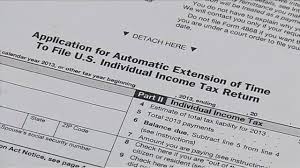 If you are like millions of Americans, you may be waiting until the last minute to file your income taxes. This is typical, especially for those who are not expecting a tax refund. In this article we look at some tips from an expert to help you avoid any tax penalties if you file late, and also how to file for a tax extension online.
If you are like millions of Americans, you may be waiting until the last minute to file your income taxes. This is typical, especially for those who are not expecting a tax refund. In this article we look at some tips from an expert to help you avoid any tax penalties if you file late, and also how to file for a tax extension online.
Our expert advice comes from Jordan Niefeld, CPA, a Certified Public Accountant working for Gerstle Rosen & Goldenberg, P.A., who points out that a failure-to-file penalty may apply if you did not file by the tax filing deadline of April 15th.
One of the fastest and easiest ways is to file taxes online, and in most cases it’s free to file income taxes online through a number of companies and even the IRS.gov. But if you are in a complicated position and need more time to file, you can also file for a tax extension online – it’s free, fast and incredibly easy.
It is important to remember, however, that if you will owe taxes, you must still pay your estimated taxes, by the April 15th deadline when you submit for your tax extension, in order to avoid any tax penalties.
According to Niefeld, “A failure-to-pay penalty may apply if you did not pay all of the taxes you owe by the tax filing deadline. The failure-to-file penalty is generally more than the failure-to-pay penalty. You should file your tax return on time each year, even if you’re not able to pay all the taxes you owe by the due date.”
To reduce any additional interest and penalties, it is recommended topay as much as you can afford with your tax return, and then explore other payment options, working with the IRS, such as getting a loan or making an installment agreement to make payments.
“The penalty for filing late is normally 5 percent of the unpaid taxes for each month or part of a month that a tax return is late. That penalty starts accruing the day after the tax filing due date and will not exceed 25 percent of your unpaid taxes. If you do not pay your taxes by the tax deadline, you normally will face a failure-to-pay penalty of ½ of 1 percent of your unpaid taxes. That penalty applies for each month or part of a month after the due date and starts accruing the day after the tax-filing due date,” says Niefeld.
In order to avoid a failure-to-pay penalty when filing for a tax extension online, it is important to pay at least 90 percent of the taxes you owe with your request. While this is not a guarantee to avoid a penalty, it typically does.
The remaining balance must then be paid by the extended due date. Finally, says Neifeld, “You will not have to pay a late-filing or late-payment penalty if you can show reasonable cause for not filing or paying on time.”
![Herbal Reference Substances are Key to Everyday Products <!-- AddThis Sharing Buttons above -->
<div class="addthis_toolbox addthis_default_style " addthis:url='http://newstaar.com/herbal-reference-substances-are-key-to-everyday-products/3512112/' >
<a class="addthis_button_facebook_like" fb:like:layout="button_count"></a>
<a class="addthis_button_tweet"></a>
<a class="addthis_button_pinterest_pinit"></a>
<a class="addthis_counter addthis_pill_style"></a>
</div>When it comes to quality control testing and the development of new products, Botanical Reference Materials (BRMs), also known as Herbal References are critically important. To help companies ultimately obtain all-important FDA approval, the Food and Drug Administration provides in its guidance a recommendation that […]<!-- AddThis Sharing Buttons below -->
<div class="addthis_toolbox addthis_default_style addthis_32x32_style" addthis:url='http://newstaar.com/herbal-reference-substances-are-key-to-everyday-products/3512112/' >
<a class="addthis_button_preferred_1"></a>
<a class="addthis_button_preferred_2"></a>
<a class="addthis_button_preferred_3"></a>
<a class="addthis_button_preferred_4"></a>
<a class="addthis_button_compact"></a>
<a class="addthis_counter addthis_bubble_style"></a>
</div>](http://newstaar.com/wp-content/uploads/2021/02/Achillea_millefolium_flowers-100x100.jpg)
![Quality Electrochemical Biosensors are Critical for Medical, Food and Chemical Industry <!-- AddThis Sharing Buttons above -->
<div class="addthis_toolbox addthis_default_style " addthis:url='http://newstaar.com/quality-electrochemical-biosensors-are-critical-for-medical-food-and-chemical-industry/3512086/' >
<a class="addthis_button_facebook_like" fb:like:layout="button_count"></a>
<a class="addthis_button_tweet"></a>
<a class="addthis_button_pinterest_pinit"></a>
<a class="addthis_counter addthis_pill_style"></a>
</div>A number of industries have, at their core, a need to frequent or even continuous analysis of biological media. These include the medical and pharmaceutical fields, biotech firms, and food and chemical companies. To maintain quality standards and develop new products, these industries rely heavily […]<!-- AddThis Sharing Buttons below -->
<div class="addthis_toolbox addthis_default_style addthis_32x32_style" addthis:url='http://newstaar.com/quality-electrochemical-biosensors-are-critical-for-medical-food-and-chemical-industry/3512086/' >
<a class="addthis_button_preferred_1"></a>
<a class="addthis_button_preferred_2"></a>
<a class="addthis_button_preferred_3"></a>
<a class="addthis_button_preferred_4"></a>
<a class="addthis_button_compact"></a>
<a class="addthis_counter addthis_bubble_style"></a>
</div>](http://newstaar.com/wp-content/uploads/2020/10/Electrochemical-Biosensor-100x100.jpg)
![Company Develops Industrial Mixers Well-Suited for both Fragile and Explosive Products <!-- AddThis Sharing Buttons above -->
<div class="addthis_toolbox addthis_default_style " addthis:url='http://newstaar.com/company-develops-industrial-mixers-well-suited-for-both-fragile-and-explosive-products/3512071/' >
<a class="addthis_button_facebook_like" fb:like:layout="button_count"></a>
<a class="addthis_button_tweet"></a>
<a class="addthis_button_pinterest_pinit"></a>
<a class="addthis_counter addthis_pill_style"></a>
</div>Industrial drum mixers are normally applied to blend mixes of varying viscosities such as adhesive slurries or cement. Some of these mixers have the capability of blending mixes of very different particle sizes such as fruit and ice cream, and gravel and cement slurry. The […]<!-- AddThis Sharing Buttons below -->
<div class="addthis_toolbox addthis_default_style addthis_32x32_style" addthis:url='http://newstaar.com/company-develops-industrial-mixers-well-suited-for-both-fragile-and-explosive-products/3512071/' >
<a class="addthis_button_preferred_1"></a>
<a class="addthis_button_preferred_2"></a>
<a class="addthis_button_preferred_3"></a>
<a class="addthis_button_preferred_4"></a>
<a class="addthis_button_compact"></a>
<a class="addthis_counter addthis_bubble_style"></a>
</div>](http://newstaar.com/wp-content/uploads/2020/06/bandeau-sofragir2-100x100.jpg)